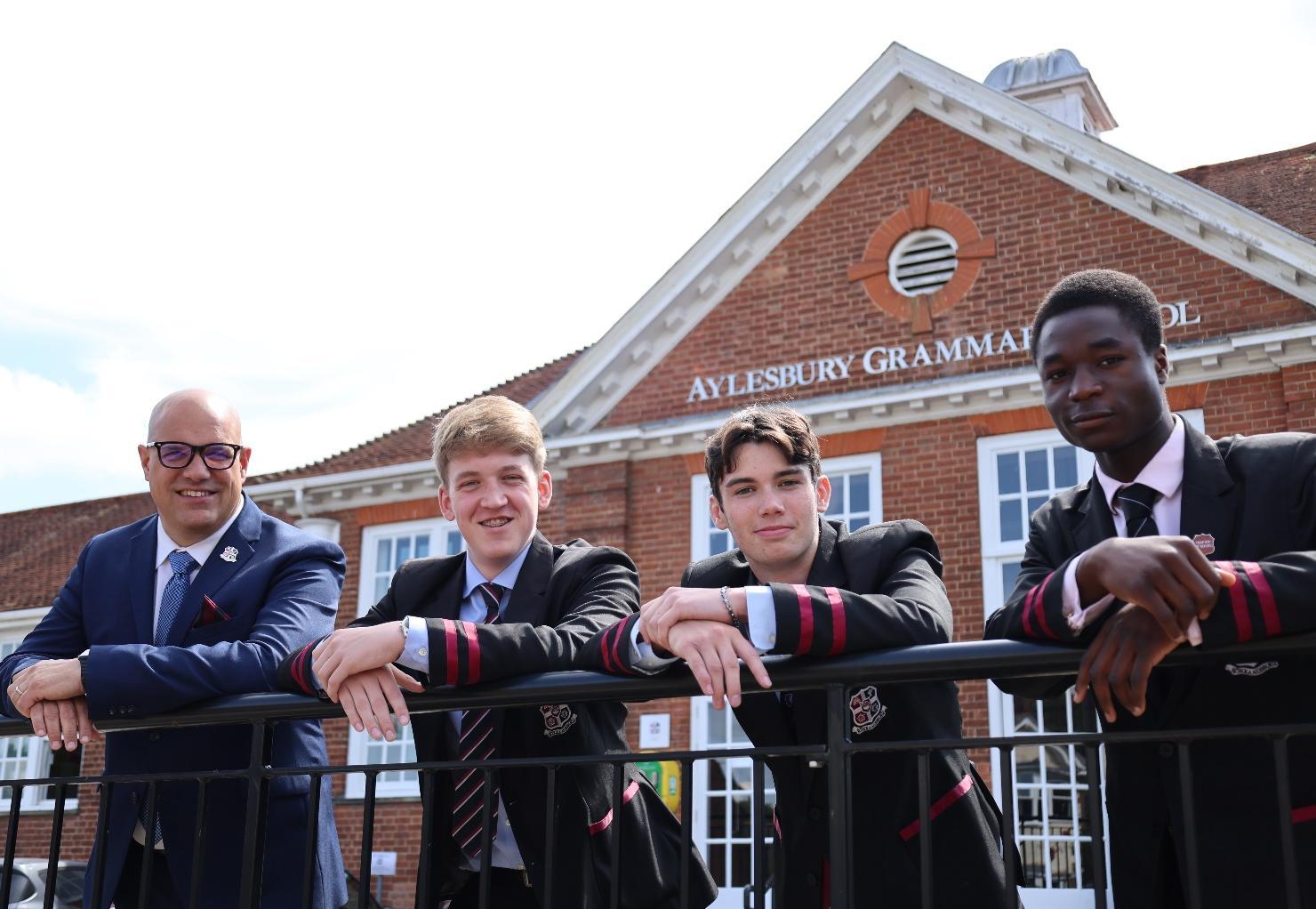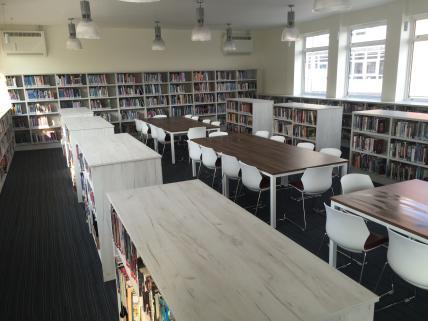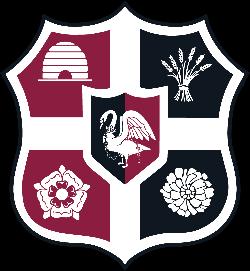







Aylesbury Grammar School has a long history of inspiring and nurturing our young people to explore for themselves who they want to be and find their place in the world.
The value of education and the strength of character of the next generation has never been greater. We are expertly placed to enable our students to flourish academically whilst also ensuring they are well-equipped to understand and meet the challenges they face with empathy and humility.
Through knowing and understanding each individual, not just through their academic achievements, our students flourish in all they do.
The School is committed to a culture of innovative learning and achievement through our pioneering expertise, an uncompromised curriculum and life-enriching opportunities across both curricular and extracurricular activities, all within an extraordinarily caring and supportive environment.
Our history of nearly 425 years is celebrated in all aspects of school life, none more so than in our House system which provides a sense of ownership, belonging and a healthy level of competition and camaraderie.
Aylesburians are, for many years to come, loyal to their school with many returning to celebrate at Old Aylesburian events, adding to their sense of identity and growth through achievement the School brings throughout their lives.
Mark Sturgeon, Headmaster


We are very pleased to welcome applications from any student who wishes to continue their studies beyond GCSE at AGS. In past years, both students from AGS and a number of students transferring from local secondary and independent schools to our Sixth Form, have benefited from the range of opportunities available at the school.
You now have some important decisions facing you about next year: 1. Whether to apply to enter the Sixth Form at AGS 2. What subjects to choose for your Sixth Form course?
This prospectus and the accompanying options booklet are designed to help you make these decisions but remember that there are other resources available as well: The careers advisers, your current tutor and subject teachers, your Head of Year, and your parents. Talk to as many people as you can as it will help you clarify your thoughts before selection.
Qualifications are becoming more and more important today and there are real difficulties facing young people who leave school without them. We are sure that studying for two years in the AGS Sixth Form is the most effective way of advancing to Higher Education and of obtaining suitable and satisfying employment.
In the Sixth Form, students have the opportunity to further their studies in subjects which interest them. While you will inevitably see your course as a means of gaining qualifications, you will also have some nonteaching or, self-directed, time in which to pursue other interests and responsibilities, as well as carrying out further independent study in your chosen subjects.
In addition to choosing your A level course of study, you are likely to want to engage in one or more of the enrichment opportunities offered at the School. These will help to broaden your outlook and understanding of life as well as helping you to build a comprehensive and meaningful CV.
There will be opportunities for you to assume positions of responsibility and leadership within the School and to participate in and organise school functions.
One very important point to realise is that our Sixth Form does not exist solely for those who are academically very able. Sixth Form life enables everyone to develop their abilities in an individual way, and to get as far as they can in the search for qualifications and a successful future.

The aims and objectives of the Sixth Form are designed to prepare our students for the increased expectations of universities and employers. As well as good A level grades, students are expected to build a comprehensive CV including work shadowing, numeracy, literacy and ICT skills as well as developing high levels of self-esteem and confidence, and the ability to set and meet personal targets.
Support and guidance will be given to the individual student who is expected to take responsibility for developing the range of experiences and skills he will need for both Higher Education and employment. It is hoped that by the end of their Sixth Form career, every student will:
• have achieved their academic potential
• be better informed about career pathways and prospects
• have made decisions on the future and achieved an appropriate place in Higher Education or employment
• have developed qualities of leadership, team-membership and independent living
• have developed a range of recreational and cultural interests
• have played an active and positive role in the School community and in the wider community
• have developed core skills in communication, independent learning, problem solving, working with others and ICT.

Our Sixth Form students are fortunate to have access to excellent facilities for independent or collaborative learning. The Sixth Form Centre comprises the Common Room, the Learning Centre and a smaller Sixth Form Study Room. These provide three distinct areas where all Sixth Form students can meet and learn. The Common Room is a social meeting area, whilst the Learning Centre and Study Room are for purposeful learning. Dependent on availability, Sixth Form students may also use the Library or IT rooms for studying.
The Common Room has its own canteen which is open during the morning. It is possible to buy a wide variety of healthy snacks and drinks at reasonable prices. Many Sixth Formers choose to have their lunch there rather than go across to the Dining Hall.
The Professor William Mead Library aims to provide a pleasant environment for study, research and recreational reading. The resources available –books, periodicals, DVDs, and newspapers – reflect and support the school curriculum. Providing an additional venue for private study and an area for information dissemination, the Library is an essential part of Sixth Form school life.


All students in the Sixth Form will have some private study, or ‘Self Directed Time’ (SDT) periods on their timetable. If a student is to make the most of their opportunities in the Sixth Form, they must learn to use the SDT periods effectively. SDT is a registered lesson, and most will be supervised by a member of staff. However, the work done within these will be decided by the student themselves.
Study is a very individual activity and there is no one method suitable for all individuals and all subjects. You will find that the questions you are tackling are less straightforward. The approach will be more openended with fewer answers that are cut and dried. Adapting to this new approach will be a sign of intellectual maturity.
The pattern of learning will also be different. Your individual learning will arise naturally from classroom study, and you will be given more discretion about how you organise your time in order to meet the demands from teachers to hand in your learning tasks regularly.
Learning in SDT is not a substitute for learning at home. To help ensure success, a Sixth Form student must be prepared to spend at least 15 hours a week (excluding the normal school day) on school learning/extra study and reading.
Independent learning will involve reviewing classroom learning, working through self-study units, completion of home learning tasks in order to consolidate understanding and reading beyond the curriculum. Such activities will be invaluable in developing a greater knowledge, understanding and appreciation of your chosen subjects and will support the later preparation for examinations.
The same school uniform rules apply as to the rest of the school - the only exception being that Sixth Form students may wear plain shirts (no patterns/logos) and V-neck jumpers, cardigans or waistcoats in single colours.


At the heart of all students’ Sixth Form curriculum is their A level studies. In addition, we offer a range of other opportunities including further academic research or study, club or group activities, sport, involvement in the local community etc. We recommend that students involve themselves in a range of activities which support their interests and aspirations in order for them to get all they can from life in the AGS Sixth Form
A lecture series has been running successfully over recent years for both Year 12 and 13 students. We have a range of speakers covering a variety of topics including health, economic, effective study habits, general interest etc. In addition, Year 12 will attend relevant lectures in a series of learning based and subject specific talks
The following subjects in List A are available for study at A level in the Sixth Form at AGS. List B contains additional options. List C contains the enrichment opportunities available. Students should carefully and clearly indicate which of these they would like to participate in, though these will not be finalised until next September.
To provide maximum flexibility we ask students to indicate their preferences in order of priority and also to provide two reserve options in order of preference. Once we have the information from students we will construct our teaching blocks. In this way we hope to cater for most subject choices but we do need to emphasise that it is unlikely that all combinations will be possible for all students. We will try to accommodate your choices but we cannot guarantee to do so. With students studying four subjects at A level, there is bound to be some restriction on subject combinations. In some cases, it may be possible to adjust choices after the GCSE results, though this cannot be guaranteed as some subjects may be full by this time as well as combination limitations. In rare circumstances, lack of sufficient uptake may mean that the school is not able to run a particular course.

Ancient History
Art and Design
Biology
Business Studies
Chemistry
Computer Science
Design and Technology
Drama and Theatre
Economics
English Literature
English Language and Literature
French
Geography
German
History
Latin
Maths
Further Maths
Music
Physical Education
Physics
Politics
Psychology
Spanish
The Extended Project Qualification (EPQ)
Geology AS level
Mathematics AS level
Photography AS level
RS AS level
Sports’ Leaders Qualification
Sixth Form games
Engineering Education Scheme
Young Enterprise
Cooking for beginners
Community Involvement
Work Shadowing
On-line learning in which students study one of the available electives (this is undertaken by all students)
Full details of all the options above (main A levels, additional courses and enrichment opportunities) can be found in the Sixth Form Options Booklet which can be found on the school website under Admissions; Year 12.

Our minimum requirement is 44 points from your best eight full GCSEs and is the same for internal and external students. This is where a grade 9 = 9 points, a grade 8 = 8 points etc.
Additionally, students should gain a 5 or above in either English Language or English Literature and Mathematics.
Exceptional cases (e.g. candidates without GCSEs because they have been educated abroad, or because they were ill) will be considered individually by a panel drawn from the senior leadership team of the school and chaired by the Headmaster.
In addition, there are minimum requirements to be able to take a subject at A level detailed below.
Subject Requirements to study the
Ancient History
Art & Design
Biology
Business
Chemistry
Computer Science
Design & Technology
Drama and Theatre
Economics
English Literature
English Language & Literature
Grade 6 in English Language or Literature GCSE (there is no classical language requirement)
Grade 6 in Art GCSE
Grade 7 in Biology GCSE or Science & Additional Science
Grade 6 in Business GCSE or Grade 6 in Maths GCSE and English Language or Literature GCSE
Grade 7 in Chemistry GCSE or Science & Additional Science
Grade 7 in Computing GCSE or grade 7 in Maths and Physics with a coding portfolio
Grade 6 in DT GCSE
Grade 6 in Drama GCSE
Grade 6 in Business GCSE or Grade 6 in Maths GCSE and English Language or Literature GCSE
Grade 6 in English Literature GCSE
Grade 6 in English Language or English Literature GCSE
French Grade 6 in French GCSE
Geography
Grade 6 in Geography GCSE
German Grade 6 in German GCSE
History
Grade 6 in History GCSE
Latin Grade 6 in Latin GCSE
Mathematics
Further Mathematics
Music
Physical Education
Physics
Politics
Psychology
Spanish
EPQ
AS Geology
AS Mathematics
AS in Photography
AS in RS

Grade 7 in Maths GCSE
Grade 8 in Maths GCSE
Grade 6 in Music GCSE
Grade 6 in Biology GCSE and grade 6 in PE GCSE if studied
One sport practised at a high level
Grade 7 in Physics GCSE or Science & Additional Science
Grade 6 in History GCSE, or English Language or Literature GCSE
Grade 6 in Biology, Maths and English Language or Literature
Grade 6 in Spanish GCSE
A total of 50 points from your best 8 GCSE grades
Grade 6 in Geology or a grade 6 in either Geography or Chemistry
Grade 6 in Maths GCSE
Grade 6 in an arts-based subject (e.g., Art, Engineering, DT, textiles) if studied
Grade 6 in RS or Grade 6 in English Language
Students in the Sixth Form study three or four A level courses from List A. For those opting for three A levels from list A, it will be necessary to study a subject from List B, some of which lead to a further qualification, and we would strongly encourage additional enrichment activities. The point score from a student’s best eight GCSEs is used as a guide to ensure that students follow the most appropriate courses for them.
Students who attain from 44 points (equivalent to four grade 5s and four grade 6s) to 50 points from their best eight GCSEs
• Three A Levels from list A
• Supervised self-guided on-line learning, where student choose electives
• Additional supervised selfdirected study time
• Additional optional enrichment activities
This is in-line with what many students would undertake nationally
Students who attain from 50 points (equivalent to six grade 6s and two grade 7s) to 59 points from their best eight GCSEs
• Three A Levels from list A
• One course from list B which leads to a further qualification*
• Supervised self-guided on-line learning, where student choose electives
• Additional enrichment activities
* or four from list A including Maths and Further Maths for very able mathematicians
Student who attain at least 59 points (approximately equivalent to six grade 7s, one grade 8 and one grade 9) from their best eight GCSEs
• Four A Levels from list A
• Supervised self-guided on-line learning, where student choose electives
• Additional enrichment activities
In Year 13 it is anticipated that the majority of students will continue with all courses undertaken at the start of Year 12 but it is recognised that students may benefit from dropping a subject. This can only be agreed through discussion with the Head of Year 13. Throughout their time in the AGS Sixth Form the minimum course of study for all students is three full A levels taken from List A with something in list C, except in exceptional circumstances and with the agreement of the Head of Sixth Form.
Each academic subject will be allocated eight periods per fortnight in both Years 12 and 13, unless numbers in a subject are very small in which case they may have fewer periods. Students of Further Maths will have more timetabled Maths lessons and will not be able to take a list B subject, but can take a list C one.
When choosing subjects the following factors should be taken into consideration:
a) The degree of interest you have in a subject. This is very important if you are going to spend two years studying the subject in depth.
b) How competent you are in the subject. You should know whether you will like a subject involving a great deal of reading or writing or one based more around problem solving.
c) Whether the subjects you choose combine together as a coherent group of studies. (For the fourth A level, you may choose a contrasting subject to give you greater breadth.)
d) Whether the subjects meet any requirement needed for a career or university course that you have in mind. You should do some research about possible university courses or employment before you make your choices.



We offer a wide range of opportunities including a full programme of sport (teams in all major sports which participate in local, county and national competitions), music (there are a range of groups covering a variety of genres) and drama (including the annual play or musical which is jointly run with Aylesbury High School).
Sixth Formers play a leading role in debating, sports leadership and subject related clubs and activities. There are also opportunities for those aiming for careers in medicine, engineering, business etc, all of which are helpful in supporting students’ UCAS applications.

A number of senior students are selected to be Prefects, Senior Prefects, Heads of House or mentors. These students play a key role in assisting with the organisation of the school and supporting younger students. Sixth Form students take a leading role in the organisation of House Competitions plus the Head Boys of both School and House and their deputies, are actively involved in assemblies, helping to run the influential Student Executive Body and many other areas of school life. A number of Sixth Form students are involved in subject mentoring or trained to help support younger students on a more pastoral level.
There are a large number of trips and visits for Sixth Formers, sometimes to support specific elements of the curriculum or to encourage wider social, cultural and sporting interests. In addition to trips to various parts of the UK, we have run expeditions to Ireland, Washington, Iceland, Java and Malawi and educational visits to European destinations are a regular feature of the school calendar. We also run senior sports tours for a range of sports including rugby, football, cricket and squash.



The Sixth Form at AGS is very large (approximately 400 students) but, despite its size, no one should feel lost in a crowd due to our effective system of pastoral care. Each student will be a member of a Tutor Group and belong to one of six Houses with a Head of House. There are also Heads of Year 12 and 13 and a Head of Sixth Form. You will be encouraged to participate in the many House competitions and Sixth Formers are expected to take a lead in organising House assemblies, competitions and activities.
In an average year, approximately 90% of our Year 13 students will go to university or other institutions to study for degrees or diplomas. Degree Apprenticeships are also becoming more common, combining work with high level study. While we encourage this route, which has obvious advantages for most of our students’ intellectual and personal development, we recognise that it may not be the best path for everybody. However, we do our best to urge all students to think seriously and realistically about their lives beyond school.
Students choosing their A level subjects are given general careers advice and are informed of how that choice may affect their prospects for Higher Education and employment. Throughout Year 12, a course of talks and discussions by the Higher Education Leader and visiting speakers explain the different types of Higher and Further Education and also the institutions where they are offered. At certain times it may also be possible for individuals to visit local firms or companies and to attend specially organised careers evenings or conventions to gain better knowledge of future options. A Higher Education evening is also held to provide parents with more information.
During the Christmas term of Year 12, potential Oxford and Cambridge candidates are identified based on results. Students may also wish to nominate themselves based on GCSE results.
Each student is allocated to a personal adviser, usually their Head of House, who will assist them in completing a UCAS application as well as providing an overall reference for any next steps. Candidates should discuss their options for colleges or alternative destinations with their adviser but are also encouraged to discuss these with their teachers, careers adviser, members of the Higher Education team and the Sixth Form team. If requested, Heads of House, Heads of Year and Head of Section may also write references for students going directly to employment.
When A level results are published, in August, senior members of staff are present in school to advise candidates on their next step.
A comprehensive set of up-to-date sources of information from UCAS (www.ucas.com), prospectuses from the Higher Education institutions and guide books which advise students how to go about applying for courses in Higher Education, are available in the Sixth Form Learning Centre. Although most information is online too especially on Unifrog.
Throughout the year there are opportunities to listen to visiting speakers on a broad range of topics related to careers and Higher Education.
The support of the Higher Education team is also available to former students who may wish to apply to university after leaving school, perhaps following a GAP year or re-consideration of long-term options.

The Student Support Department is located directly opposite the Sixth Form Learning Centre. It is led by Mrs Richards, an experienced SENDCo and Mental Health Advocate, who works closely with the Heads of Year 12 and 13 and the Head of Sixth Form.
The Department supports all students with Special Educational Needs and Disability (SEND), including those with Social, Emotional and Mental Health difficulties and is at the forefront of promoting the Whole School Mental Health Strategy (supported by Mind, Bucks). The Department has an open door policy which means students do not need a formal diagnosis to access support. It is an area where students can come to be listened to and supported. This includes support with organisation, study skills and revision techniques.
In addition to the above, the Department works closely with a number of external agencies, both NHS and private, including CAMHS (Children and Adolescent Mental Health Services), AuTC (Autism Teaching Company) and Everlief.
Full time students over the age of 16 whose annual household income is £25,000 or less may be eligible to apply for a Sixth Form Bursary. Application forms are available from the school website and should be submitted to the school Finance Manager as soon as possible after registration in September of Year 12 and Year 13. Applications are made to the Sixth Form Bursary Fund Committee, and it is they who will inform students of any bursary grant. Further information is available via the school website (under Parents; Letters and Forms).


Students in Year 11 at Aylesbury Grammar School should complete the internal application form by signing in to your school account and following the link: https://forms.gle/JLCipBw9JoZ6Tr657
Monday 30 September 2024
Thursday 7 November 2024
Thursday 21 November 2024
Friday 6 December 2024
7 – 20 January 2025
February 2025
May 2025 (Date TBC)
Friday 27 June 2025
Thursday 21 August 2025
Thursday 4 September 2025
Year 11 Parents’ Information Evening about Sixth Form entry
Year 11 Parents' Consultation Evening with subject teachers
Prospective Sixth Form Open Evening and subject fair
Deadline for provisional A level subject choices
Year 11 Mock GCSE exams
Meetings carried out with individual Year 11 students to provide guidance on A level subject choices
Study Leave begins
Sixth Form Orientation Day. It is essential to attend if you wish to return to AGS Sixth Form
GCSE examination results - meetings with Miss Treherne for students wishing or needing to change their choice of subjects
Transition Day – term begins for Sixth Form students

Students not currently at Aylesbury Grammar School should complete the external application form which can be found by following the link: https://forms.gle/hKyJprQfzbqBUW747
You can apply at any time and the deadline for applications is 17 January 2025, though late applications will still be considered. Once we have received your application, we will contact your current school to request your predicted GCSE grades.
We run a Sixth Form Orientation Day on Friday 27 June 2025 for applicants to the AGS Sixth Form. Applicants who are likely to fulfil the criteria for entry into the AGS Sixth Form will be invited to attend by 11 April 2025.
After places have been allocated in August, if we do not give you a place because we are full, but you still really want to come here, you can tell us that you want to be on the waiting list. The waiting list will be kept until the end of the second week of term and, if you have not heard from us by then, you will know no place has become available.
A student who has qualified for entry into the Sixth Form will in most cases be able to study the subjects for which he is qualified, but this will be dependent on there being sufficient places in the classes provided for each subject. The school reserves the right to refuse access to subjects when planned classes are full. Only in exceptional cases will any place be offered in Year 12 starting after September, or at any time in Year 13, because of the nature of the A level course.
The normal age of admission to the Sixth Form is 16 years. If special circumstances dictate, we will consider applications from students aged 15 or 17 years but we do not accept applications from those who are younger or older than this.
This document should be read in conjunction with our Admissions Policy, available on our website.
Thursday 21 November 2024
Friday 17 January 2025
Friday 11 April 2025
Friday 27 June 2025
Thursday 21 August 2025
Friday 22 August 2025
Thursday 4 September 2025

Open event for Sixth Form entry
Deadline for external applications
Invites for Sixth Form Orientation Day sent
Sixth Form Orientation Day
New entrants should notify the school to confirm your GCSE results and that you will attend a meeting the next day. A copy of your results will be required
Meetings for new students with the Head of Sixth Form
Transition Day – term begins for Sixth Form students
Students who have joined the AGS Sixth Form from other schools have done extremely well in the past, contributing to the success of our A level results, including 21% of grades at A*, 53% at A*/A and 77% at A* - B in 2023 – full details can be found on the school’s website. The table below shows the number of A levels external entrants have gained in recent years



Tel: 01296 484545
Web: ags.bucks.sch.uk

Aylesbury Grammar School, Walton Road, Aylesbury, Buckinghamshire, HP21 7RP




